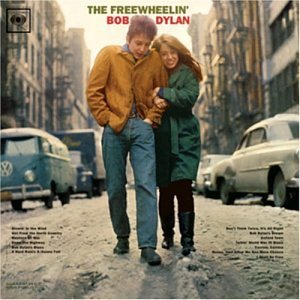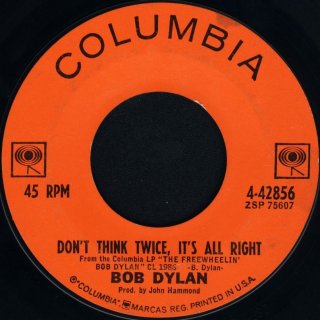Related Research Articles

The Freewheelin' Bob Dylan is the second studio album by the American singer-songwriter Bob Dylan, released on May 27, 1963, by Columbia Records. Whereas his self-titled debut album Bob Dylan had contained only two original songs, this album represented the beginning of Dylan's writing contemporary lyrics to traditional melodies. Eleven of the thirteen songs on the album are Dylan's original compositions. It opens with "Blowin' in the Wind", which became an anthem of the 1960s, and an international hit for folk trio Peter, Paul and Mary soon after the release of the album. The album featured several other songs which came to be regarded as among Dylan's best compositions and classics of the 1960s folk scene: "Girl from the North Country", "Masters of War", "A Hard Rain's a-Gonna Fall" and "Don't Think Twice, It's All Right".

The Times They Are a-Changin' is the third studio album by the American singer-songwriter Bob Dylan. It was released on February 10, 1964, through Columbia Records. Whereas his previous albums, Bob Dylan and The Freewheelin' Bob Dylan, combined original material and cover songs, this was the first to feature only original compositions. The album consists mostly of stark, sparsely arranged ballads concerning issues such as racism, poverty, and social change. The title track is one of Dylan's most famous; many feel that it captures the spirit of social and political upheaval that characterized the 1960s.

"Don't Think Twice, It's All Right" is a song written by Bob Dylan in 1962 and released the following year on his album The Freewheelin' Bob Dylan and as the B-side of the single "Blowin' in the Wind". The song has been covered by several other artists, including Waylon Jennings in 1964, Susan Tedeschi, Emilie-Claire Barlow in her 2010 album The Beat Goes On and Peter, Paul and Mary, who released it as a single, which reached the Top 10 of the Billboard Hot 100.
"Masters of War" is a song by Bob Dylan, written over the winter of 1962–63 and released on the album The Freewheelin' Bob Dylan in the spring of 1963. The song's melody was adapted from the traditional "Nottamun Town." Dylan's lyrics are a protest against the Cold War nuclear arms build-up of the early 1960s.
"Bob Dylan's Dream" is a song written by Bob Dylan in 1963. It was recorded by Dylan on April 24, 1963, and was released by Columbia Records a month later on the album The Freewheelin' Bob Dylan.
"Let Me Die in My Footsteps" is a song written by American singer-songwriter Bob Dylan in February 1962. The song was selected for the original sequence of Dylan's 1963 album The Freewheelin' Bob Dylan, but was replaced by "A Hard Rain's a-Gonna Fall". This version was recorded at Columbia studios on April 25, 1962, during the first Freewheelin' session, and was subsequently released in March 1991 on The Bootleg Series Volumes 1–3 1961–1991.
"I'll Keep It with Mine" is a song written by Bob Dylan in 1964, first released by folk singer Judy Collins as a single in 1965. Dylan attempted to record the song for his 1966 album Blonde on Blonde.
"Tomorrow Is a Long Time" is a song written and recorded by Bob Dylan. Dylan's version first appeared on the album Bob Dylan's Greatest Hits Vol. II compilation, released in 1971. It was subsequently included in the triple LP compilation Masterpieces.
"Oxford Town" is a song written by American singer-songwriter Bob Dylan in 1962. It was recorded in Columbia's Studio A on December 6, 1962, for his second album, The Freewheelin' Bob Dylan.
"Talkin' John Birch Paranoid Blues", also known as "Talkin' John Birch Society Blues" and "Talkin' John Birch Blues", is a protest song and talking blues song written by singer-songwriter Bob Dylan in 1962. It is a satirical song, in which a paranoid narrator is convinced that communists, or "Reds" as he calls them, are infiltrating the country. He joins the John Birch Society, an anti-communist group, and begins searching for Reds everywhere. The narrator decries Betsy Ross as a communist and four U.S. Presidents as Russian spies, while lauding Adolf Hitler and George Lincoln Rockwell. After exhausting the possibilities of new places to find communists, he begins to investigate himself.

The Bootleg Series Vol. 9: The Witmark Demos: 1962–1964 is a compilation album by American singer-songwriter Bob Dylan, containing demo recordings he made for his first two publishing companies, Leeds Music and M. Witmark & Sons, from 1962 to 1964. The seventh installment of the ongoing Bob Dylan Bootleg Series, it was released on October 19, 2010 on Legacy Records.
"John Brown" is a song by American singer-songwriter Bob Dylan. The song, written in October 1962 was released under his pseudonym "Blind Boy Grunt" on the Folkways Records compilation album Broadside Ballads, Vol. 1 (1963). Live performances have been officially released on MTV Unplugged (1995), Live at The Gaslight 1962 (2005), and Live 1962–1966 – Rare Performances From The Copyright Collections (2018). A demo version was issued on The Bootleg Series Vol. 9 – The Witmark Demos: 1962–1964 (2010).

In Concert – Brandeis University 1963 is an album from a concert performed by American singer-songwriter Bob Dylan at the Brandeis Folk Festival at Brandeis University in Waltham, Massachusetts, on May 10, 1963.
"Farewell", also known as "Fare Thee Well", is a song by American singer-songwriter Bob Dylan. Dylan wrote the song in January 1963. He considered it for his third album, The Times They Are a-Changin', but only attempted a few takes during the album's first studio session. Dylan's earlier recordings of "Farewell" found their way onto various bootlegs, and a collection of demos that included the song was released in October 2010 as The Bootleg Series Vol. 9 – The Witmark Demos: 1962–1964.
"Mama, You Been on My Mind" is a song by American singer-songwriter Bob Dylan. Written in 1964 during a trip to Europe, the song dealt with his recent breakup with his girlfriend, Suze Rotolo. Dylan first recorded the song in June of that year during a session for his album Another Side of Bob Dylan. However, the song was not included on the album, and Dylan's version remained unreleased until 1991. In total, in the 1990s and 2000s four versions were put out on Dylan's Bootleg Series of releases, including two live performances with Joan Baez from 1964 and 1975.

The 50th Anniversary Collection: The Copyright Extension Collection, Volume 1 is the first collection by Bob Dylan that Sony Music released to prevent the recordings from legally entering the public domain in Europe. The album features studio and live recordings from 1962 that have not previously been commercially released. Sony reportedly released only 100 copies each of the four-CD-R "1962" set. The set was released only in Europe.
Bob Dylan is an American musician, singer-songwriter, music producer, artist, and writer. He has been an influential figure in popular music and culture for more than five decades. Much of his most celebrated work dates from the 1960s when he was an informal chronicler and a seemingly reluctant figurehead of social unrest.
"Talkin' Bear Mountain Picnic Massacre Blues" is a song by American singer-songwriter Bob Dylan. It was written by Dylan in June 1961, and recorded on April 25, 1962, at Studio A, Columbia Recording Studios, New York, produced by John Hammond. It is a humorous talking blues, which Dylan wrote after Noel Stookey gave him a press clipping about how the sale of forged tickets for a Father's Day picnic trip to Bear Mountain State Park had led to overcrowding and injuries.
"I Shall Be Free" is a song by American singer-songwriter Bob Dylan. It was recorded on 6 December 1962 at Studio A, Columbia Recording Studios, New York, produced by John Hammond. The song was released as the closing track on The Freewheelin' Bob Dylan on 27 May 1963, and has been viewed as a comedic counterpoint to the album's more serious material. Dylan has never performed the song in concert.
"Down the Highway" is a song by American singer-songwriter Bob Dylan. It was recorded on July 9, 1962 at Studio A, Columbia Recording Studios, New York, produced by John Hammond. The song was released on The Freewheelin' Bob Dylan on May 27, 1963. It is a twelve-bar blues love song, which Dylan told his girlfriend Suze Rotolo he had written about her.
References
- ↑ "The Freewheelin' Bob Dylan - Bob Dylan | Songs, Reviews, Credits". AllMusic . Retrieved 2021-05-31.
- ↑ "Bob Dylan: The Recording Sessions (part 1)". Punkhart.com. Retrieved 2021-01-03.
- ↑ "The Bootleg Series, Vol 9: The Witmark Demos: 1962-1964 | The Official Bob Dylan Site". Bobdylan.com. Retrieved 2021-01-03.